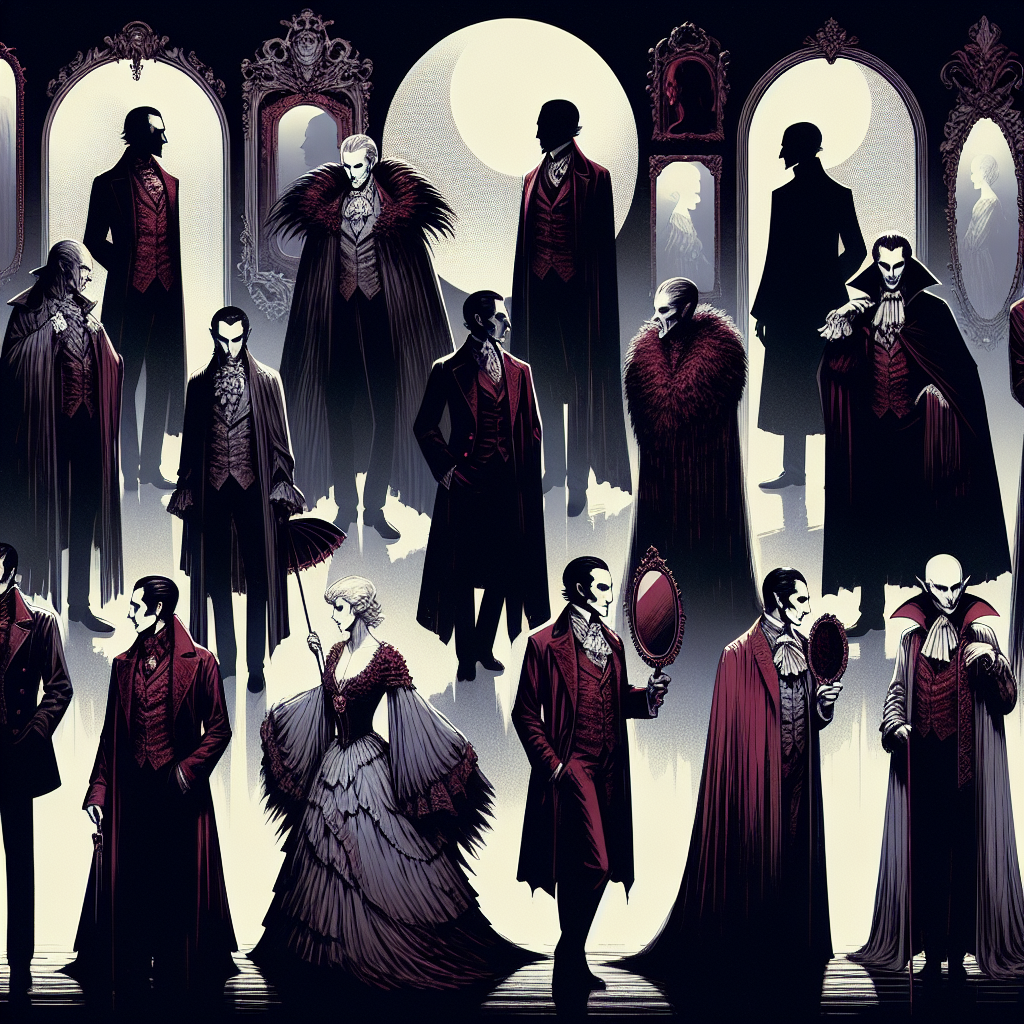The Complete Guide to 11 Types of Vampires in Romance Fiction
Vampires have captivated readers for centuries, embodying the eternal dance between darkness and desire, mortality and immortality. These supernatural beings exist in the shadowy realm between life and death, tapping into our deepest fears while simultaneously awakening our most forbidden desires. What began as terrifying folklore monsters has evolved into complex, multifaceted characters that dominate modern romance literature.
The transformation of vampires in fiction reflects our changing relationship with the unknown. Once portrayed as purely monstrous predators lurking in ancient legends, today's vampires are sophisticated beings capable of love, redemption, and profound emotional depth. They represent the ultimate forbidden romance—powerful, dangerous, and eternally devoted.
What Makes Vampires Irresistible in Romance?
The appeal of vampire romance lies in its perfect blend of danger and devotion. These immortal beings offer readers an escape into a world where love transcends time, death, and societal boundaries. Their supernatural nature creates an inherent tension that drives compelling narratives forward.
Universal Vampire Romance Traits
Eternal Youth and Beauty: Vampires possess an otherworldly attractiveness that never fades, representing the ultimate fantasy of timeless love and desire.
Tragic Immortality: The curse of watching loved ones age and die creates a poignant backdrop that adds emotional weight to every romantic connection.
Supernatural Charisma: Enhanced abilities of persuasion, hypnotic gazes, and irresistible charm make vampires naturally compelling romantic leads.
Protective Power: Their superhuman strength and speed position them as formidable guardians, capable of defending their beloved against any threat.
Forbidden Nature: The inherent danger of loving a predator creates delicious tension and raises the stakes of every romantic encounter.
Internal Conflict: The constant battle between bloodlust and love adds layers of complexity that make vampire characters psychologically fascinating.
The 11 Essential Vampire Archetypes
1. The Tormented Soul
This vampire archetype carries the weight of centuries on his shoulders. Haunted by past sins and struggling with an existence he never chose, the tormented vampire approaches love with equal parts longing and fear. His greatest conflict lies in wanting human connection while believing himself unworthy of it.
Signature traits: Self-imposed isolation, protective distance from loved ones, constant internal struggle with his nature.
Appeal: Readers are drawn to the redemptive power of love and the possibility of healing ancient wounds.
2. The Magnetic Predator
Confidence radiates from this vampire type like an aura. He understands his supernatural appeal and wields it like a weapon, using charm and seduction to achieve his goals. Though potentially dangerous, his transformation through love creates compelling character growth.
Signature traits: Overwhelming charisma, strategic use of supernatural abilities, confident pursuit of desires.
Appeal: The fantasy of taming the untameable and being the one who changes a powerful being's heart.
3. The Noble Guardian
Rarest among vampire types, this character has maintained his humanity despite his transformation. He views mortals not as prey but as beings worthy of protection, often becoming a supernatural knight defending the innocent.
Signature traits: Strong moral compass, reluctant acceptance of vampire nature, protective instincts toward humans.
Appeal: Represents the possibility of goodness surviving even supernatural corruption.
4. The Stoic Immortal
Centuries of existence have taught this vampire to suppress emotion as a survival mechanism. His icy exterior masks profound depth, and the right connection can awaken feelings he believed long dead.
Signature traits: Emotional detachment, analytical approach to relationships, hidden vulnerability beneath cold facade.
Appeal: The challenge of melting an frozen heart and discovering the passionate being within.
5. The Ancient Aristocrat
Born from nobility or created by ancient bloodlines, this vampire embodies refinement and sophistication. His otherworldly elegance and vast resources create an intoxicating atmosphere of luxury and power.
Signature traits: Centuries of accumulated wealth, refined mannerisms, initial sense of superiority over mortals.
Appeal: The fantasy of being chosen by someone who could have anyone, elevating the beloved's worth.
6. The Supernatural Rebel
This vampire rejects the traditional rules of his kind, forging his own path regardless of consequences. His rebellious nature often puts him at odds with vampire society, making him an outsider even among outcasts.
Signature traits: Defiance of vampire hierarchy, independent lifestyle, willingness to break taboos for love.
Appeal: The bad-boy archetype amplified by supernatural power and the danger of forbidden romance.
7. The Possessive Alpha
Dominance defines this vampire's approach to love. Once he claims someone as his mate, his devotion becomes absolute and his protection unwavering. His possessiveness can be overwhelming but stems from genuine, eternal love.
Signature traits: Territorial behavior, intense protective instincts, complete devotion to chosen mate.
Appeal: The fantasy of being someone's entire world and receiving unconditional, powerful love.
8. The Eternal Romantic
Despite centuries of existence, this vampire maintains faith in true love and soulmate connections. He approaches romance with reverence, viewing it as sacred and worth any sacrifice.
Signature traits: Belief in destined love, patient devotion, willingness to wait centuries for the right person.
Appeal: The promise of a love that transcends time and the romantic ideal of perfect devotion.
9. The Conflicted Hybrid
Caught between two worlds, the hybrid vampire struggles with dual nature—part human, part supernatural being. This internal conflict creates unique storylines about identity and belonging.
Signature traits: Enhanced abilities beyond typical vampires, struggle with dual identity, attempts to live in both worlds.
Appeal: Relatability of not fitting in anywhere while possessing extraordinary abilities.
10. The Isolated Wanderer
Self-imposed exile defines this vampire's existence. Traumatic experiences have made him distrust others, but the right connection can teach him to hope again.
Signature traits: Solitary lifestyle, distrust of others, gradual opening through romantic connection.
Appeal: The healing power of love and the transformation of wounded souls.
11. The Primal Hunter
Closest to traditional vampire mythology, this archetype is driven by bloodlust and supernatural hunger. When love enters the equation, it creates fascinating tension between beast and heart.
Signature traits: Struggle with basic vampire nature, intense internal battles between love and hunger, potential for both tenderness and violence.
Appeal: The ultimate test of love's power to overcome even the most primal instincts.
The Evolution of Vampire Romance
Modern vampire fiction has transformed these creatures from pure monsters into complex beings capable of growth, redemption, and profound love. This evolution reflects changing attitudes toward morality, redemption, and the nature of humanity itself.
The "good vampire" concept explores whether supernatural beings can transcend their nature through choice and love. These characters grapple with moral dilemmas, seek redemption for past actions, and often become protectors rather than predators.
Their struggles mirror human conflicts—battling destructive impulses, seeking meaningful connections, and striving to become better than their circumstances suggest they should be. This relatability, combined with supernatural power and eternal devotion, creates the perfect romantic fantasy.
Why Vampire Romance Endures
Vampire romance satisfies multiple psychological needs simultaneously. It provides escapism through supernatural elements while exploring deep human emotions and conflicts. The immortal nature of vampires allows for epic love stories that span centuries, while their dangerous aspects add excitement and tension.
These stories also explore themes of acceptance, redemption, and the transformative power of love. Readers find hope in the idea that even the most damaged beings can change, grow, and find happiness through genuine connection.
The vampire romance genre continues evolving, with authors finding new ways to reinvent these timeless archetypes while maintaining the core elements that make them eternally appealing. Whether brooding and tormented or confident and seductive, vampires remain the ultimate romantic fantasy—powerful beings who choose love over everything else, offering devotion that literally lasts forever.
💝 Ready to Explore More Romance?
If you enjoyed this article about Vampire writing, discover thousands of captivating love stories on our platform.
Download App







